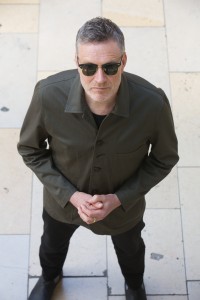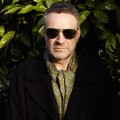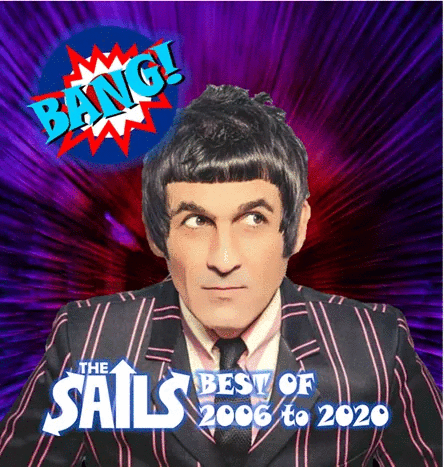An Interview with Blancmange:
Neil Arthur on New Album, Family Ties and Fernweh
(& just what it means to want to be ‘somewhere else’).
A show reviewed last year at Rescue Rooms, Nottingham was the first time I really encountered Blancmange. I’d had an awareness, an occasional knowledge of the odd track or accolade, but that show was my main introduction.
Right after the show, once the lights got turned up, I tried grabbing a couple of words. It was last night of tour and then wasn’t the time but I was assured I could grab a word sometime.
A year later and  have a new album ready. I get offered the chance to interview Neil Arthur, Neil being the heart of Blancmange.
have a new album ready. I get offered the chance to interview Neil Arthur, Neil being the heart of Blancmange.
Questions prepped didn’t prep me for all that we covered and I’d heard of reluctance to dig into songs. To my surprise and his, open talk came of making, of family, of meanings. Tours, ties, tangents and ‘Wonderlust’ – the album that’s due out this month.
I sit all limbs crossed for my new call recorder, hoping it works like it should. Neil answers calm in distilled Yorkshire tones, excerpts from the call come below…
WW: Wonderlust, the new album will be your fourth album out within last two years. Between Unfurnished Rooms, Fader, Near Future, what is it that keeps you making at such speed, that keeps you producing so often?
NA: …well… I’m not aware of an urgency in that sense but I’m enjoying the creative process, I’m really enjoying the collaboration as well. And I can write about what I want, there’s a lot going on in my head I suppose. And with the manager I have, the way we work it is, because we have our own record label, well I own my own record label, we can try and get stuff out there.
With the new material we’re not dealing with big record companies – it’s a different story with the older material but that is another story, so I think – I am probably at my happiest when I’m being creative.
So I feel quite comfortable in that. I mean I’m never happy with the songs, I always want them to be better but it would be a weird feeling if I was satisfied I think – You keep striving.
WW: And between the projects and collaborations, do you find that your methods of making and the way that you approach these projects differ from project to project?
NA: Yes. And the fundamental thing there Will, is that it differs because I’m working with different people. And where I’m working with Benge for example, with Blancmange, the approach is different for Blancmange than it would be if we were working at Fader. And the simple reason for that is… with Blancmange I write the songs, I start the songs off and take a structured song to Benge, so then we start working on it and undoing it, so changing for example the sound of a bass on a track, or the drums, and then put it back together.
But then, with Fader, what happens is Benge starts with the music so he’ll do a rudimentary backing track, send it to me, and I will react to that. So… It’s going to be different. Because the origin each time is… as I’ve just described. And of course with Near Future, working with Bernholz, the exciting thing about that one is I never know what Jez (Bernholz )is going to do. And vice versa hopefully.
WW: I was going to ask, when you do these collaborations, when it’s you who brings the first ideas, do people know roughly what to expect? Do you try and play around?
NA: I hope they don’t know what to expect, I hope they don’t know. You know I’m always after a surprise there myself. And that’s the exciting thing when you say …’oh bloody ‘ell, I didn’t expect that’, so yeah I try something new. I don’t really have a formula… I know I turn a computer on and how to work some of the synths – not all of them – and quite often they surprise me. And I’m also dyslexic so I’m never quite sure what the lyrics are going to be like.
WW: Comparing Wonderlust with Fader and Unfurnished Rooms, there’s a less frosty feel to the music, there’s something almost organic in the electronic sounds. Was there something different in mindset or mood when you were making the songs for this album?
NA: In a way, in terms of writing, it’s a continuation from Unfurnished Rooms but I was aware that the structure of the songs was becoming slightly different from that, and when I felt that was happening, I stopped writing for a bit. I changed direction slightly. And I ended up writing a load of dance orientated tracks, of which, off the top of my head, I can only say that Wonderlust had been restructured and put on the album, but the dance aspect was taken away a little bit. The one that didn’t change too much was Distant Storm.
As for more organic… I mean it’s all synths, my guitar’s on it, David plays leads, and in fact Benge said to leave my guitar on it. Normally it’s quite often taken off or David, who is a much better guitarist, replaces it and does something much better. But we left my guitar on which is very simplistic. I’m trying to get to this ‘organic’ that you mentioned…
WW: …I was thinking that from the track ‘Taking To Machines’ onwards, you start to step into Scary Monsters / Bowie territory and things start to sound a bit wider, warmer, more cinematic….
NA: Well that might be down to production, choice of sounds, it wasn’t a conscious effort. It wasn’t a formula and if that’s nice… and you’re enjoying it, well… that’s fine, there was no master plan really. We’ve got 16 songs, let’s get 10 of them on an album. I don’t really have a good answer for you is what I’m saying.
WW: I wanted to raise a part of the press release for the new album that references a ‘powerful desire to be somewhere else’. What might this somewhere else be, what state or place?
NA: […after some hesitation …] I don’t think it’s a physical place or time, it’s just, well […a little more hesitation…], it’s different levels. Let’s take the last track on the album, without going into all of the detail, and the lyrics are very straight forwards, I’m singing it from a couple of different points of view but fundamentally I’m singing as a parent realising that you need to let go, letting go of your children. Not that I’m holding onto them it’s just that kind of mental state you’re in that says ‘blimey, they’re going’.
I’m at an age where your children are going, and though they’re always your babies …but they’ve gone away. I miss them terribly. And I know other people must feel, on all different levels at different stages, that it’s a real pull. Because you’ve got to let go and you have to be that person. You can’t hold them. You’ve got to let go.
And that’s in the best possible scenario because it’s not always that good. But also, in this song I’m saying that this place they need to go to is more than wonderlust – there’s a German word but that’s closest we got, this desire to go away, to be away from where you are.
There’s a German word spelt Fern-W-E-H, fernweh, and that is so much more, we don’t have it in the English language. It’s more than ‘wonderlust’. It’s a word that fascinated me when I came across it in a book I was reading and it was talking about somebody, their mental state and how this person was always longing to be somewhere else. He had this compulsion, this thing, they called it ‘fernweh’, to absolutely need to be not where he was. So he couldn’t focus on what was going on around him, or what he was meant to be doing, he had to be in this other place. He had to go mentally, and physically to go and find it.
And that’s what that song is… and if somebody wants to take it, well there’s other stuff. There’s a lot of other stuff going on around and a lot of stuff I don’t like and I’m sure you don’t like it either, and you just go ‘fucking ‘ell [laughs], for Christ’s sake’. And you gotta do something about it.
The main part of the song is me being both people – I am the person that’s going but I’m also the person observing it – trying to do the two things at once within the song. And musically I’ve taken a reference from early Neu! songs. I absolutely love ’em. And that’s where I’ve gone with that song. I’ve tried to keep it very simple with this build and this bit in the middle that’s the realisation point where…’yeah, you really are going to have to let go’. You know, you’re trying to hold on and you can’t, even when you’re doing it mentally and you kind of say ‘go on, just let it go and enjoy that part of it.’
I don’t think I’ve ever said that to anybody. I prefer ambiguity in terms of discussing songs but there you go, that’s your lot.
WW: Last time I saw you, from your music and especially from some of the earlier tracks you played, I thought I picked up on a -and I hate to say it – working class anti-Thatcherite anger. Something similar to that found in parts of Britpop and Smiths-era indie. Would this be a fair thing to pick up on?
NA: A really straight answer would be that I’m not happy with the current situation and I don’t think a lot of people are. And I think a lot of people who thought they were would probably reflect and say ‘if I dig deep and think, neither am I’. So there’s a lot of stuff I’m not happy about. BUT… there’s no way I’m going on stage and being on a soapbox. It’s not a soapbox, it’s a stage. And these are songs and I’ve got poetry over the top of a load of music and within there, there are going to be observations. And some of them are observations I feel very strongly about.
We get disconnected here, at my end or his. When we reconnect we recap last question and Neil answers quick, still and blunt;
NA: For me it all went wrong with Thatcher so there we go.
WW: The other thing I wanted to ask about that show is, what you think it was that made it such a warm and friendly experience?
NA: To answer that, the audience. And I’m bloody lucky. We’re very, very lucky to have an audience that welcomes the new songs, that listen, that give them a chance and seem to embrace those, which is fantastic! And they enjoy the older stuff.
A couple of days ago it was 36 years since, and I didn’t know this, but 36 years since our first album came out. Somebody put something out on one of them Instagrams and that was the audience, so how lucky are we to have an audience like that? That’s down to them.
WW: You’ve got 16 dates coming up in November, you’ve got a real mix of venues coming up. Are these familiar places to play?
NA: Well Darwin is my home town so that’s a very familiar place and very much looking forward to it. And of course you know we’re coming to Nottingham and we’ve played there a few times. And there’s a few of them we don’t know and some of them we do, some of them are smaller and some are big places.
Thing is we play to the ones who come along not the ones who don’t… and those that come along they’ll be a part of it and they’ll help to build that atmosphere that you just described as we journey through Wonderlust and more recent albums right back to stuff from Happy Families.
Aware that we’ve been talking for longer than maybe either Neil or I had planned, we wrap up the call with a mutual thanks and a cautionary tale about following the audience when song words get lost. Neil laughs as he has done throughout the conversation and wishes me luck in writing this up. I’m left feeling like I got more than let off, let in.
And a credit is due to my friend Rikki Bent who helped me decipher some Lancashire phrases. But neither she nor her workmates could help me work out what Neil’s dad used to say about talking to brick walls… Neil said I’d have trouble printing that and he’s right.
Wonderlust – the new album – is out October 19th on Blanc Check Records.
The first single from the album ‘Distant Storm’ is out now.
Blancmange play Nottingham’s Rescue Rooms on November 2nd.
Find full UK tour and album information at http://www.blancmange.co.uk
Will Wilkinson
Music and travel writer



